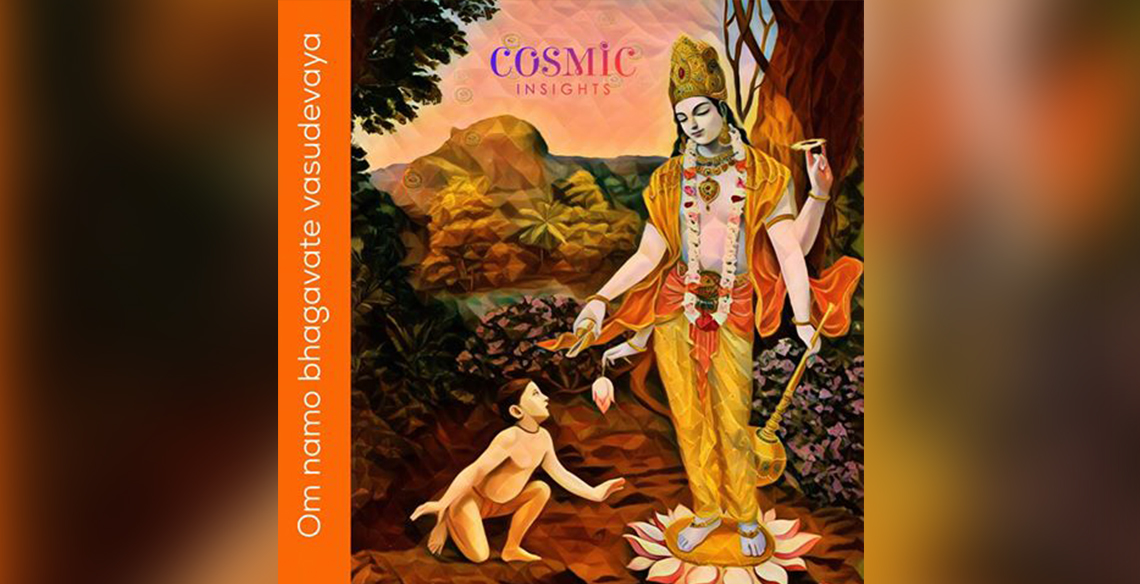Wednesday is ruled by Mercury – and Lord Vishnu is the deity of Mercury!
I is a great time to take a pause, and read the story of Dhruva.
This great story from the Purnanas, has a great significance. Determination, Surrender of desires, Steadfastness etc can take a person to great heights!
Dhruva was born a son of the King Uttānapāda (the son of Svayambhuva Manu) and his wife Suniti. The king also had another son Uttama, born to his second queen Suruchi, who was the preferred object of his affection. Once, when Dhruva was a child of five years of age, he was sitting on his father’s lap at the King’s throne. Suruchi, who was jealous of the older son from the first wife (since he – Dhruva – would be heir to throne, and not Suruchi’s son), forcefully removed Dhruva from his father’s lap. When Dhruva protested and asked if he could not be allowed to sit on his father’s lap, Suruchi berated him saying, ‘only God can allow you that privilege. Go ask him.’
Suniti – being of gentle nature and now the lesser favorite wife – tried to console the distraught child, but Dhruv was determined to hear of his fate from the Lord himself! Seeing his firm resolve, his mother bade him farewell as he set out on a lonely journey to the forest. Dhruva was determined to seek for himself his rightful place, and noticing this resolve, the divine sage Narada appeared before him and tried to desist him from assuming a severe austerity upon himself at such an early age.
But, Dhruv’s fierce determination knew no bounds, and the astonished sage guided him towards his goal by teaching him the rituals and mantras to meditate on when seeking lord Vishnu. The one mantra which Narada taught and which was effectively used by Dhruv was Om Namo Bhagavate Vasudevaya. Having been advised, Dhruv started his meditation, and went without food and water for six months, his mind fixed on the Lord.
The austerity of his tapasya shook the heavens and the Lord appeared before him, but the child would not open his eyes because he was still merged in his inner vision of Vishnu’s form described to him by Narada. Lord Vishnu had to adopt a strategy of causing that inner vision to disappear. Immediately Dhruva opened his eyes, and, seeing outside what he had been seeing all along in his mental vision, prostrated himself before the Lord.
But he could not utter a single word . The Lord touched his right cheek by his divine conch and that sparked off his speech. Out poured forth a beautiful poem of praise of the Lord in 12 powerful verses, which together are called Dhruva-stuti.
Vishnu Purana gives a slightly different account here. When Vishnu was pleased with Dhruva’s tapasya and asked him to ask for a varadān (grant of wishes), Dhruv said that he (being an uneducated child) did not know how to sing the praise of Lord Vishnu, and therefore asked the varadān of a knowledge of stuti (hymn in the praise of Vishnu). Other persons would have asked for worldly or heavenly pleasures, or for moksha at most, but Dhruva had no personal desire. Renunciation of all desires is regarded to be essential for eternal peace in Hinduism: this is the meaning of Dhruva-pada. That was the reason why the Saptarshis decided to give Dhruva the most revered seat of a Star.
The Dhruva-stuti as mentioned in the Vishnu Purana is an extended version of the Vedic Purusha sukta and is quite different from the Dhruva-stuti of Bhagavata Purana.
Having spent a long time in the Lord’s remembrance he even forgot the objective of his tapasya, and only asked for a life in memory of the Lord. Pleased by his tapasya and by his stuti, Vishnu granted his wish and further declared that the lad would attain Dhruvapada – the state where he would become a celestial body which would not even be touched by the Maha Pralaya, or the final destruction.
Dhruva returned to his kingdom, to be warmly received by his family, and attained the crown at the age of six. He ruled for many decades in a fair and justice manner.


Hello! Very helpful app indeed. Thank you for putting it out there. One suggestion on the Mahadasha time period. It would be helpful to know what those planterary influences will be during that time period. It would be great to click on each and know what’s time cycle will be about. I know I am in a Moon Dasha, I do know what it entails but will soon be going into my Mars Dasha… would be good to prepare.